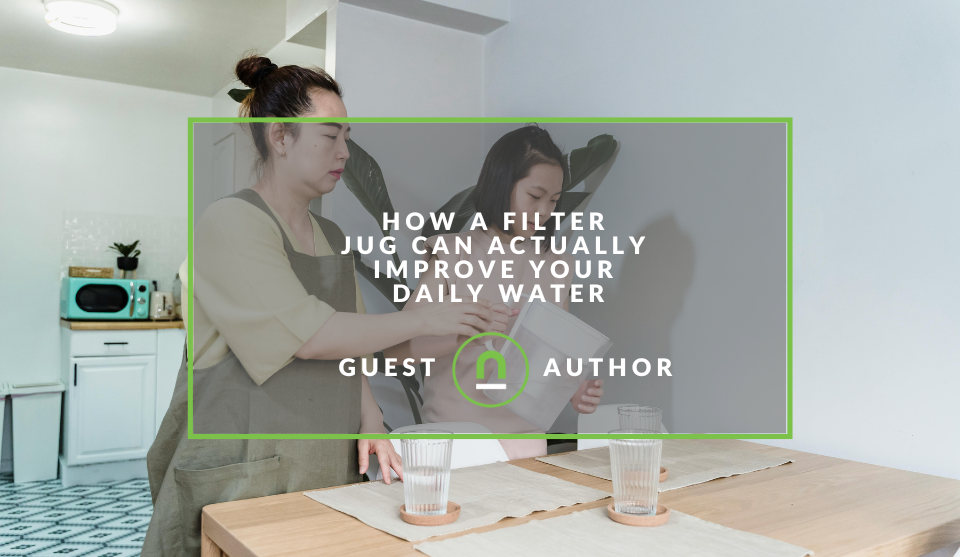Recent posts

Shopaholics
How a Filter Jug Can Actually Improve Your Daily Water
30 October 2025

Doctors Orders
Grow Your Practice With SEO - Physio's Guide To Marketing
28 October 2025

Doctors Orders
How To Grow Your Chiropractor Practice
27 October 2025

Press Releases
Cape Town Welcomes the World - Volleyball World Beach Pro Tour Officially Opens in South Africa
24 October 2025
Popular posts
Extravaganza
Trending Music Hashtags To Get Your Posts Noticed
24 August 2018
Geek Chic
How To Fix iPhone/iPad Only Charging In Certain Positions
05 July 2020
Extravaganza
Trending Wedding Hashtags To Get Your Posts Noticed
18 September 2018
Money Talks
How To Find Coupons & Vouchers Online In South Africa
28 March 2019
How a Filter Jug Can Actually Improve Your Daily Water
30 October 2025 | 0 comments | Posted by Jasper J in Shopaholics
You might have noticed that tap water doesn’t always taste quite right. Well, a filter jug can help with that. I’m not saying it’s some kind of miracle, but for most people, it really does make a difference. At first, it doesn’t seem like much.
But after a week or so, you’ll probably notice your water tastes cleaner, tea brews better, and, oddly enough, you might even drink more without thinking about it.
Why Water Quality Matters
Water is something we tend to take for granted.
It’s just there, right?
But if you stop and think about it, the quality affects more than taste. Tap water can have chlorine, tiny particles, or minerals that give it a slightly strange flavour. A filter jug won’t remove everything, of course.
Still, it can make a noticeable difference.
It’s worth noting that families often find this reassuring. Knowing the water for cooking, drinks, or the kids is filtered, even a little, can be comforting. Small change, but it makes daily life feel a bit easier.
What are the Potential issues with unfiltered Tap Water?
The potential issues associated with regularly drinking unfiltered tap water vary widely depending on your location, the age of your plumbing, and the quality of your municipal water system. While tap water is generally treated to meet safety standards, there are several contaminants that may still be present and pose a risk over time.
Microbiological Risks
In rare cases or following a public water system failure (like a pipe burst or treatment lapse), the risk of pathogens can increase.
- Bacteria and Viruses: Pathogens like E.2 coli, Salmonella, or viruses can enter the system, causing acute illnesses like diarrhea, cholera, typhoid, or dysentery. Municipal water treatment (chlorination/chloramination) is designed to eliminate these, but issues can still occur.
- Protozoa: Parasites like Giardia and Cryptosporidium are more resistant to standard chlorine disinfection and can cause gastrointestinal illness.
Chemical and Heavy Metal Contaminants
These contaminants are typically odourless and tasteless, making them a greater concern for long-term health effects. Heavy Metals (Leaching from Pipes)
- Lead: This is the most common concern, especially in older homes with lead service lines or lead solder. Regular exposure, even at low levels, is particularly harmful to children and can lead to neurological damage, developmental delays, and kidney problems.
- Copper: High levels from corroded copper pipes can cause gastrointestinal distress, and long-term exposure can lead to liver or kidney damage.
- Arsenic: Can occur naturally in groundwater and is linked to various cancers and cardiovascular disease.
Disinfection Byproducts (DBPs)
- Chlorine/Chloramine: These are necessary to kill microbes, but the chemicals can react with organic matter in the water to form Trihalomethanes (THMs) and Haloacetic Acids (HAAs). Long-term exposure to these byproducts has been linked to potential cancer risk and reproductive issues.
Industrial & Agricultural Pollutants
- Pesticides, Herbicides, and Nitrates: Runoff from agriculture can contaminate water sources. High nitrate levels, especially, can affect infants ("blue baby syndrome").
- PFAS (Per- and Polyfluoroalkyl Substances): Known as "forever chemicals," these are from industrial waste and consumer products and are highly persistent.They are linked to potential immune system effects and cancer.
- Pharmaceuticals and Microplastics: Trace amounts of various medications and tiny plastic particles are increasingly found in water sources due to wastewater discharge. The long-term effects of low-level consumption are still being studied.
Aesthetic and Nuisance Issues
While not a direct health risk, these issues impact the experience and maintenance of your home.
- Bad Taste and Odour: Often caused by chlorine/chloramine, sulfur, or mineral content (iron, manganese).
- Water Hardness (Minerals): High concentrations of calcium and magnesium lead to scale buildup (limescale) in pipes and appliances (reducing their efficiency) and can interfere with soap/detergent.
How a Filter Jug Works
Honestly, it’s simple. Most jugs have a cartridge with activated carbon or something similar. Water goes through, and the cartridge traps impurities like chlorine, limescale, and certain metals.
The result is water that tastes cleaner, smells fresher, and feels lighter when you drink it. You might notice that your tea or coffee tastes smoother, too. Not a huge leap, I know, but chlorine and other residues do affect flavour.
Little detail, but mornings feel a touch nicer.
Choosing the Right Jug
Not all filter jugs are the same. Some hold more water, some work faster, and cartridges last different amounts of time. For most people, it’s a balance between convenience and fridge space.
How often you want to refill matters too.
Hard water, common in parts of South Africa, leaves limescale on taps and kettles. Certain jugs handle this better. Saves a bit of scrubbing later. Not a massive deal, but handy nonetheless.
Note: Hard water is simply water with a high concentration of dissolved minerals, primarily calcium and magnesium ions. It is formed when water percolates through deposits of rock and soil, such as limestone, chalk, or gypsum, which are rich in these minerals.
Everyday Benefits You’ll Notice
Even though it seems small, a filter jug can make daily life better. Water tastes nicer, hot drinks are smoother, and you might drink more water without even trying.
For kids, it helps them drink plain water more willingly. You’ll probably notice that if water tastes odd, children avoid it. Simple, but it makes a difference in routines.
Maintenance Made Easy
Cleaning and maintenance are key. Rinse it regularly, replace the cartridge as recommended. Otherwise, it won’t work properly. Bit of a nuisance at first, yes, but quick and worth it. Some jugs have indicators to remind you when to swap the cartridge. Usually,
every four to six weeks works fine, depending on how much water you use and the local supply.
Still Undecided?
In most developed areas, municipal tap water is safe to drink under current regulations. However, an in-home filter provides an extra layer of protection, mainly by reducing chemical contaminants (like disinfection byproducts and chlorine) and heavy metals (like lead from your home's pipes) that can impact your health over decades.
If you are concerned about your local water quality, the best first step is to check your local municipality's Annual Water Quality Report (Consumer Confidence Report).
Clean up Your Act
So, is a filter jug worth it? Well, for what it’s worth, most people find it makes a subtle but real difference. It’s not just about removing particles, it’s about making water pleasant to drink, improving tea and coffee, and encouraging better hydration without even thinking.
Are you looking to promote your business?
Business owners can create their free business listings on nichemarket. The more information you provide about your business, the easier it will be for your customers to find you online. Registering with nichemarket is easy; all you will need to do is head over to our sign-up form and follow the instructions.
If you require a more detailed guide on how to create your profile or your listing, then we highly recommend you check out the following articles.
Recommended reading
If you enjoyed this post and have a little extra time to dive deeper down the rabbit hole, why not check out the following posts on water
- Sanitation And Water Management Trends in 2023
- What Are The Various Types Of Water Tanks?
- Considerations Before Working With Wastewater Management
Tags: Shopping Guide, Guest Post
You might also like
A Guide to Press Release Sites in South Africa
01 October 2025
Posted by Che Kohler in nichemarket Advice
A Complete Guide to Press Release Sites in South Africa: We compare Free vs Paid Options & How to Measure Their Value (2025) to get the best cost per...
Read moreGrow Your Practice With SEO - Physio's Guide To Marketing
28 October 2025
Posted by Nathan Meyer in Doctors Orders
Grow your physio practice with SEO, including advice on building locally relevant pages and optimisations to attract more real-world customers. Read ...
Read more{{comment.sUserName}}
{{comment.iDayLastEdit}} day ago
{{comment.iDayLastEdit}} days ago
 {{blogcategory.sCategoryName}}
{{blogcategory.sCategoryName}}
